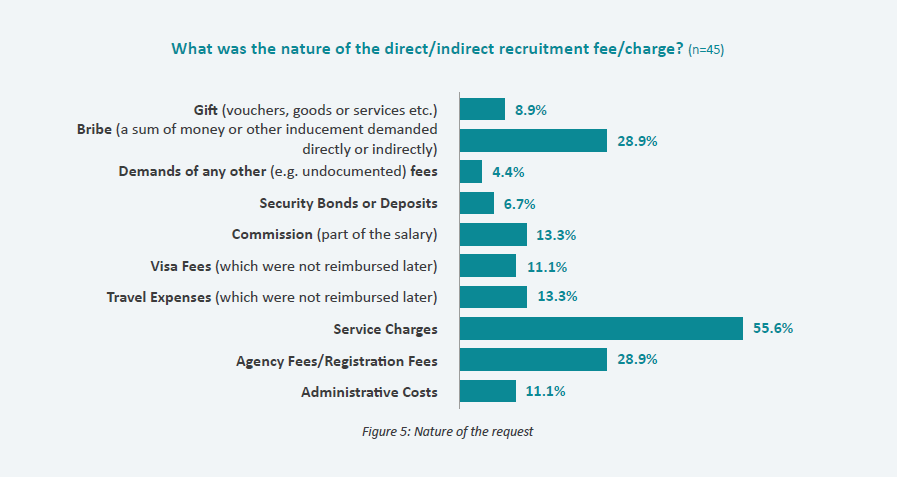You are here
Seafarers are charged an average of $1,872 on illegal recruitment fees
Seafarers are charged an average of $1,872 on illegal recruitment fees
The Editorial Team July 3, 2023 https://safety4sea.com/seafarers-are-charged-an-average-of-1872-on-illeg...
A new report by Liverpool John Moores University (LJMU) and the Mission to Seafarers (MtS) highlights the magnitude of illegal recruitment fees and levies charged on seafarers in breach of the Maritime Labour Convention.
The Survey on Fees and Charges for Seafarer Recruitment or Placement report shines a light on instances in which seafarers are being forced into paying illegal fees and charges, further confirming the extent of this serious problem and providing a better understanding of how widespread the issue is.
Key findings
Almost 65% of respondents stated that they were aware of illegal demands for recruitment or placement fees, either through personal experience or the experience of a colleague.
92% of respondents declared that these corrupt practices must come to an end; an important figure as it highlights an awareness that such fees and charges are not an acceptable part of the hiring process.
In terms of the nationalities and countries where illegal fees were most prevalent, 29% of cases were related to Indian citizens (followed by Filipino and then Burmese/Myanmarese citizens) and in 36% of cases, the demand for fees was made in India (followed by the Philippines and then Burma/Myanmar).
58% of respondents stated that the demand for illegal fees and charges were from the crewing agent appointed by the shipping company. 31% said it was from an individual with links to the crewing agent and 11% said the demand came from an employee of the shipping company.
When asked about the nature of the demand, 56% responded that it was described as a ‘service charge’, 29% as ‘agency fees/registration fees’ and 29% as a ‘bribe’.
The sums involved varied from US$50-100 up to US$7,500, with the average being US$1,872. In 10% of reported cases, the seafarers affected are still in debt.
29% of respondents had experience of their documents being unlawfully withheld during the recruitment process; typically their Continuous Discharge Certificate/Seamans’s book, passport or Certificate of Competency.
The report includes a survey of over 200 seafarers, drawn from a wide variety of ranks, age and nationalities.
To remind, the Institute for Human Rights and Business (IHRB) and the Sustainable Shipping Initiative (SSI) also published a study on Seafarers and Recruitment Fees. In their study based on responses by 5,000 seafarers, almost 40% experienced at least one form of unethical or illegal action in violation of international standards relating to worker rights either during the recruitment process or while working at sea.
Such behaviour is a clear breach of the Maritime Labour Convention (MLC), an international treaty adopted by the International Labour Organisation. The MLC entered into force in 2013 and is often referred to as the ‘Seafarers’ bill of rights.’ It makes clear that no fees or charges should be borne by the seafarers for their recruitment, placement, or employment, other than for their seafarers’ book, statutory medical certificate, and passport.
Consequences on seafarers
In addition to the financial burden, the stress and strain inflicted can take its toll on the mental health of seafarers, while also limiting their career opportunities. In the worst cases, this exploitation can lead to serious human right violations, with seafarers trapped in debt bondage and forced to endure exploitative working conditions, The Mission to Seafarers notes.
According to the The Mission to Seafarers, Extended family separation further compounds the distressing circumstances, as seafarers find themselves unable to speak out against other abusive or dangerous practices.
These practices can trap seafarers in debt bondage, compelling them to endure exploitative and abusive working conditions. What is truly disheartening though is that such practices tarnish the image of the maritime industry, leading to its perception as exploitative and unfair.… said Dr. Christos Kontovas, LJMU report lead author
The issue of illegal fees also poses a serious reputational risk for the shipping industry, leading to a breakdown in trust between seafarers and employers. Moreover, it exacerbates existing labour shortages in the shipping industry, discouraging existing seafarers from returning to sea and putting off the next generation from considering seafaring careers, The Mission to Seafarers highlights.
Seafarers’ suggestions
Key recommendations
Definition of the fees and charges
Review of national regulation to ensure compliance with MLC
Increasing education and awareness
Providing help to obtain experience during the first years of employment
Improved complaint procedures
If shipping wants to be able to attract and retain the talented seafarers that it relies upon, it will require meaningful action from national and international regulators, shipping companies, and the recruitment sector to drive out this practice.… said Ben Bailey, The Mission to Seafarer’s Director of Programme

